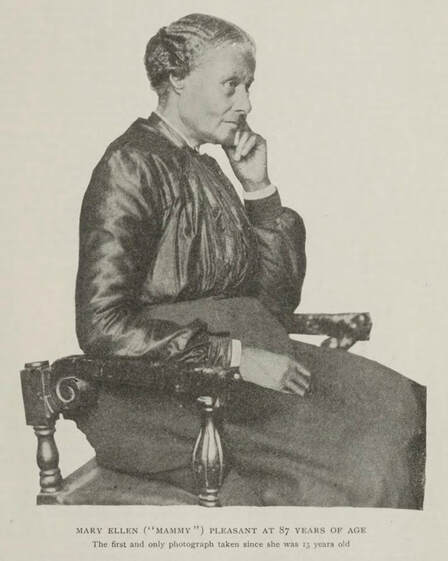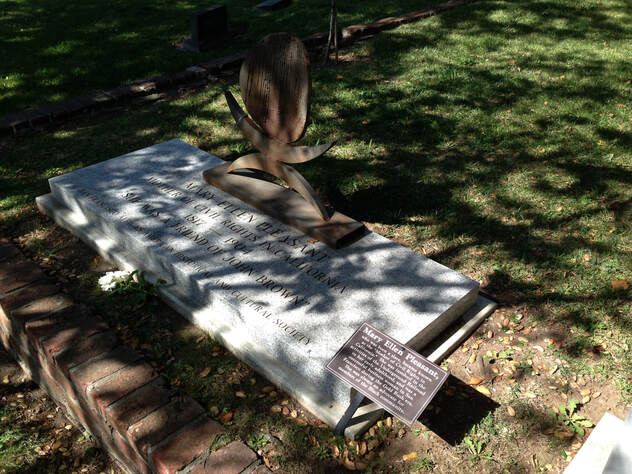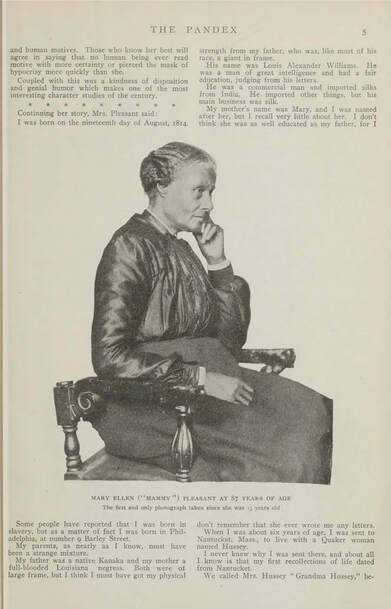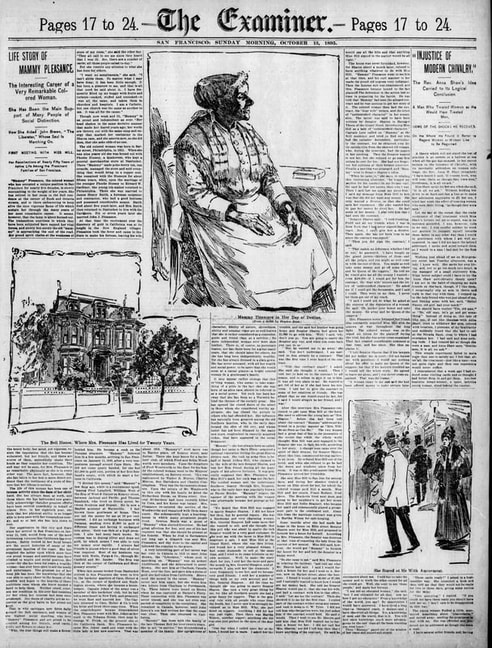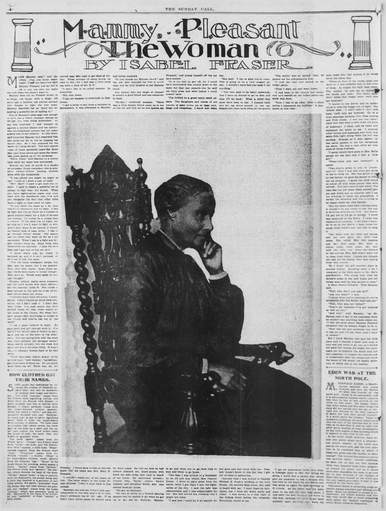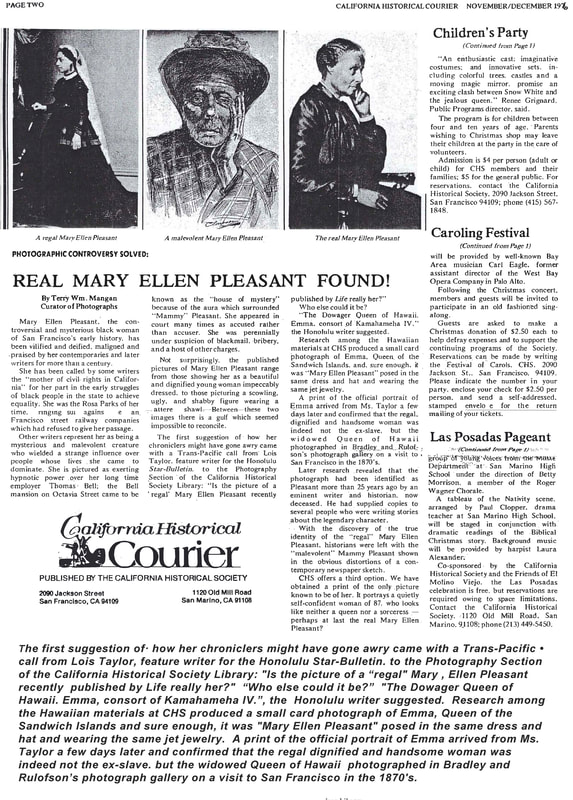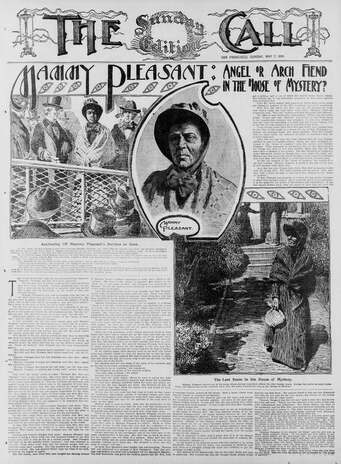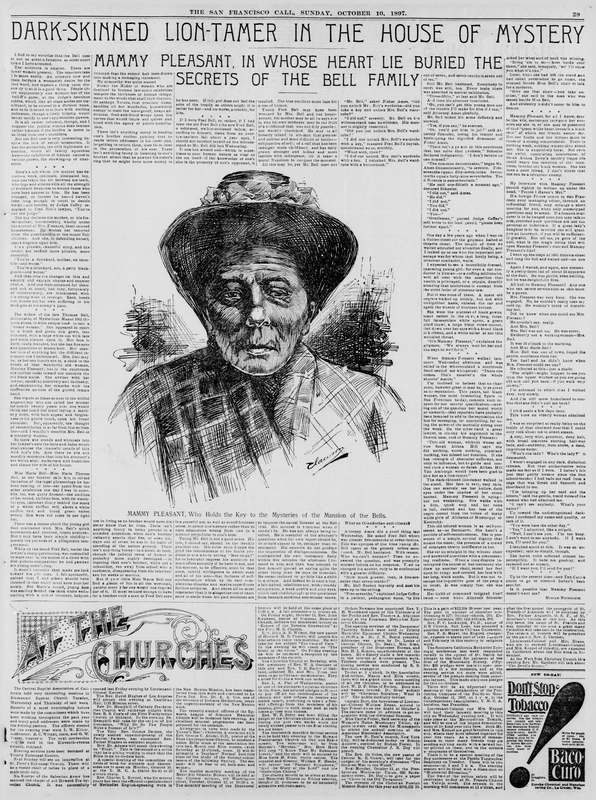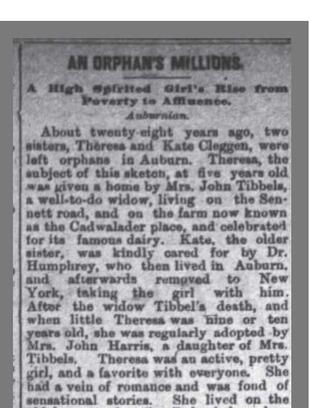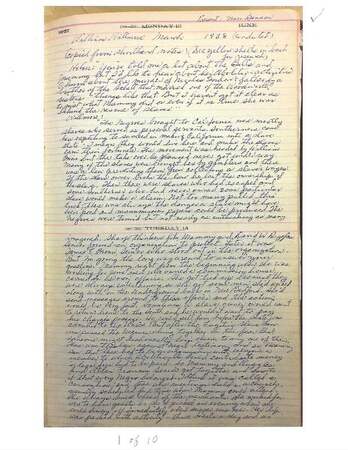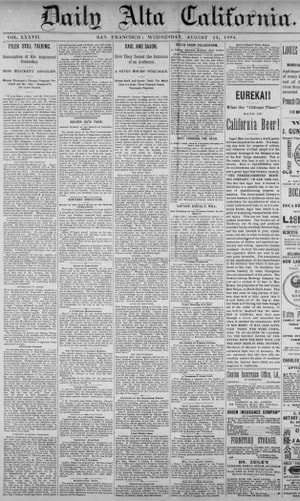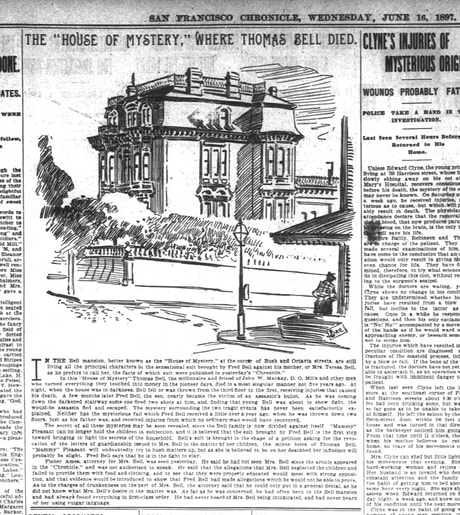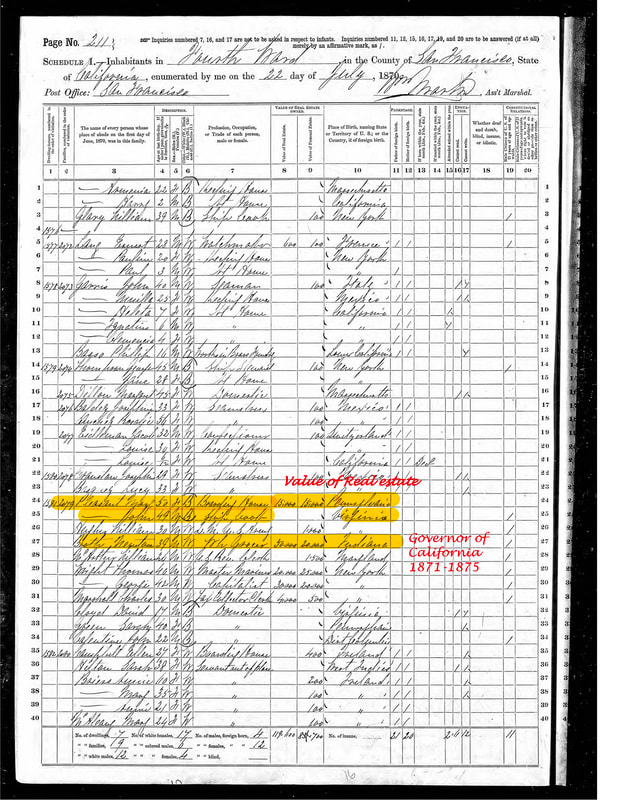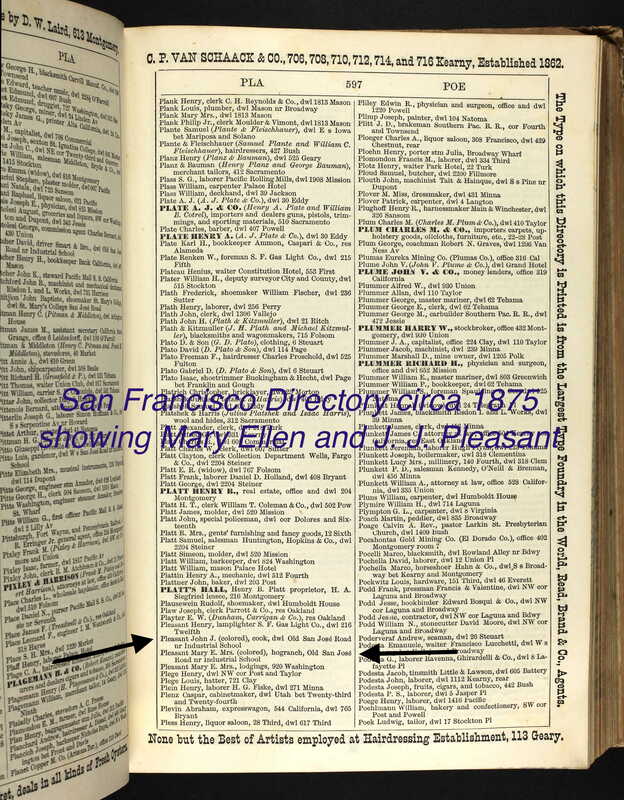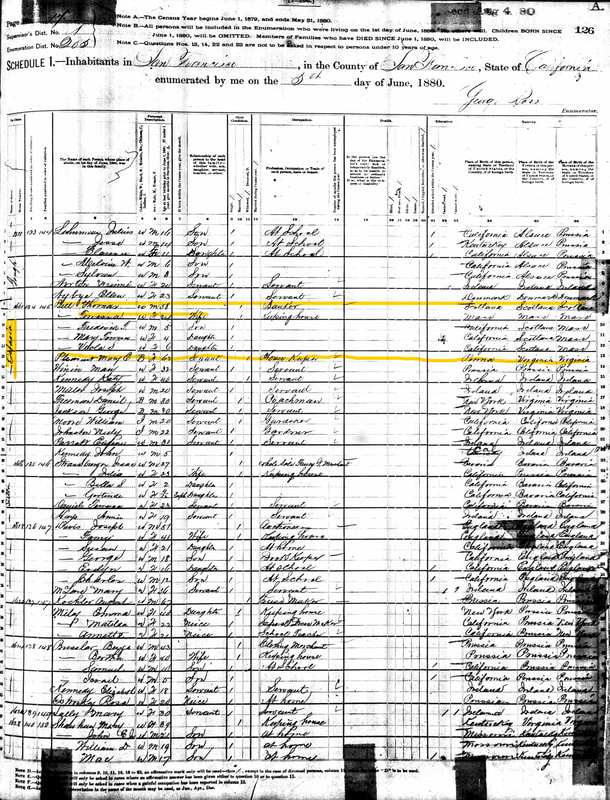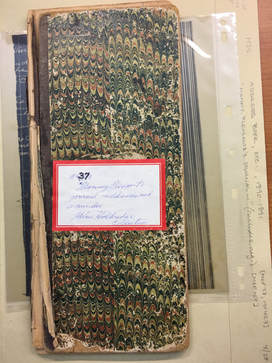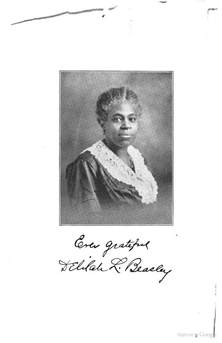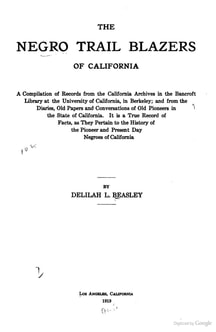|
I stared at the plaque and the four blue gum trees, all that is left of the House of Mystery at 1661 Octavia Street. I heard an icy cold whisper. "Resurrect Me" she said. In stolen moments, I dig through the mislabeled miscellany of a life scattered. At the height of her success in San Francisco in the 1870’s, Mary Ellen Pleasant was worth over $30 million in 1875 dollars. According to her autobiography (Part One - Part Two was never published) she was born on August 19th, 1814 in Philadelphia. Her father was Louis Alexander Williams, a native Kanaka and Mary Ellen, a full blooded African from Louisiana. In 1835, she married a Cuban tobacco grower, James W. Smith, in Boston. He died in 1844 at their plantation in Charles Town, Virginia. A few years later, she married JJ Plaissance, the grandson of Henri Christophe, black emperor of Haiti, and they had a girl, Lizzie. They spent time in New Orleans with Marie Laveau, but were forced to flee upon threat of discovery of their Underground Railroad activities. She came to California on a ship that also carried a young Scotsman, Thomas Bell. In 1857, when Mary Ellen met back up with Thomas Bell, she owned three laundries, a saloon, and investments in the several black-run businesses. She contributed $30,000 to John Brown, the new leader in the fight against slavery. A handwritten note was found on John Brown after he was arrested for the raid on Harper’s Ferry. It said: “The axe is laid at the root of the tree. When the first blow is struck, there will be more money and help. - MEP” After her business partner, Thomas Bell died in a fall, his widow, Theresa Clingan Bell, who had always resented Mary Ellen, set about destroying her reputation and taking title to her assets. She was forced to leave the mansion she had built at 1661 Octavia Street, and died in the small apartment of Olive Sherwood in 1904, nearly penniless. Her last request was that her tombstone should read “She was a friend of John Brown’s”, and there in Tulocay Cemetery in Napa where she was buried, that is indeed what appears on her grave marker.
|
|
In Part One of her autobiography, Mary Ellen objected strenuously to her insulting nickname saying "I am Mammy to no one". Here is an excerpt from the first article written by her friend Samuel P. Davis of Nevada. I am still looking for Part Two...
"The history of her life is given very nearly as it came from her lips. It is full of originality, quaint philosophy and a rare insight into human nature and human motives. Those who know her best will agree in saying that no human being ever read motive with more certainty or pierced the mask of hypocrisy more quickly than she. Coupled with this was a kindness of disposition and genial humor which makes one of the most interesting character studies of the century." - Sam Davis " I have been accused of many things, and under the load of accusation I have held my tongue. I have never been given to explaining away lies, and you can't explain away the truth..." I was born on the nineteenth day of August, 1814. Some people have reported that I was born in slavery, but as a matter of fact I was born in Philadelphia, at number 9 Barley Street. My parents, as nearly as I know, must have been a strange mixture. My father was a native Kanaka and my mother a full-blooded Louisiana negress. Both were of large frame, but I think I must have got my physical strength from my father, who was, like most of his race, a giant in frame. His name was Louis Alexander Williams. He was a man of great intelligence and had a fair education, judging from his letters. He was a commercial man and imported silks from India. He imported other things, but his main business was silk. My mother's name was Mary, and I was named after her, but I recall very little about her. I don’t think she was as well educated as my father, for I don't remember that she ever wrote me any letters. When I was about six years of age, I was sent to Nantucket, Mass., to live with a Quaker woman named Hussey..." |
|
"HER EPITAPH IS WRITTEN" published by San Francisco Call January 13, 1904. Here is an excerpt:
The remains of "Mammy" Pleasant, who died early Monday morning at the home of Lyman M. Sherwood on Filbert street will rest to-night under the soil of the little cemetery in the town of Napa, to which her body was taken this morning. One of the last requests of Mrs. Pleasant was that there be placed above her grave a tombstone bearing her name, age, nativity and the words: "She was a friend of John Brown." One of the many interesting stories of her eventful career told by Mrs. Pleasant was her experiences during the exciting times preceding the outbreak of the Civil War. With the money inherited from her first husband she had come to California and was here in 1858, when the first stories of John Brown's efforts to free the slaves of the South were conveyed to San Francisco. Being in full sympathy with the movement she conceived the idea of lending her financial assistance to the undertaking, and April 5, 1858, found her eastward bound with a $30,000 United States Treasury draft, which had been procured for her through the aid of Robert Swain, John W. Coleman and William Alvord. Reaching Boston Mrs. Pleasant arranged for a meeting with John Brown in Windsor, Canada... |
|
LIFE STORY OF MAMMY PLEASANCE published by the San Francisco Examiner on October 10, 1895. Here is an excerpt:
"Her experiences in this city and State since her arrival In San Francisco on January 15, 1849, would form one of the most interesting volumes that California has ever known. Safely locked in her loyal breast are the secret histories of many of the prominent families of the coast. She has supplied the ladder upon which more than one proud woman and ambitious man have climbed to wealth and social position. Her purse - for she has been for years a wealthy woman - has ever been open to aid the needy and unfortunate. The greatest joy of her busy life has been the knowledge that she was able to carry cheer to the homes of the humble and hopes to the hearths of those ambitious ones whom she knew needed a hand to help them. Neither creed, color, sex nor condition in life ever had meaning for her when her interest had been once awakened. Her deeds of charity are as numerous as the grey hairs in her proud old head...She subsequently kept a boarding house in which many prominent people lived. Newton Booth was a guest of "Mammy" when elected Governor. He had great affection for her, and one of his last requests was that she should be present at his funeral. When he died in Sacramento not long ago a dispatch was sent Mrs. Pleasance, and she went to the capital and followed the remains to the grave. A very interesting part of her career was her visit to Canada in 1858 to meet John Brown, the "Liberator," whose soul is marching on. "Mammy" was an ardent Abolitionist, and she determined to assist Brown. She met him at Chatham, Canada West, over the line, and gave him a purse of gold she had taken from California. Brown used the money in the cause. "Mammy" never saw him again, but she wrote him two letters from Chatham to Portsmouth, Va. These letters were found on Brown when he was captured at Harper's Ferry. |
A photo of Queen Emma of Hawaii from 1865 is NOT the young Mary Ellen Pleasant, as claimed by Helen Holdredge. The facts are laid out in the article below.
|
"Mammy Pleasant Angel or Fiend?" published by The San Francisco Call May 7, 1890. Here is an excerpt:
""She came to California in '50. There was a price on her head in the South and she wanted to get as far away from home as possible. Her connection with the "underground railway" was an established fact and planters whose slaves she had helped cross the border to the free North demanded her life as a recompense. In the early fifties "a ship coming in through the Golden Gate" was a far rarer and more welcome sight in San Francisco than a gold nugget. So when the vessel on which Mrs. Pleasant was a passenger around Cape Horn put into the harbor, all of tent-covered San Francisco was there to welcome it. When the rich merchants, richer miners and good livers in town heard that there was a colored girl on the vessel and that she was "one of the greatest cooks that ever came out of the South" there was an excited and tumultuous scramble to engage her services..." |
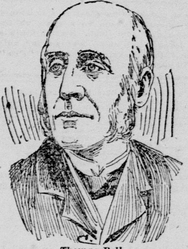
San Francisco Call October 17, 1892
The Fatal Fall of Capitalist Thomas Bell DOWN A FLIGHT OF STAIRS. While Moving About His Home in the Darkness He Took the Wrong Door... Thomas Bell of the firm of Thomas Bell & Co., commission merchants, died suddenly at his residence, 1661 Octavia street, at 1:30 o'clock yesterday morning, from injuries he received three hours before his death. Mr. Bell has been an invalid for several weeks....
The Fatal Fall of Capitalist Thomas Bell DOWN A FLIGHT OF STAIRS. While Moving About His Home in the Darkness He Took the Wrong Door... Thomas Bell of the firm of Thomas Bell & Co., commission merchants, died suddenly at his residence, 1661 Octavia street, at 1:30 o'clock yesterday morning, from injuries he received three hours before his death. Mr. Bell has been an invalid for several weeks....
|
Excerpt from "An Orphan's Millions"
...Theresa and Kate Cleggen, were left orphans in Auburn. Theresa, the subject of this sketch, at five years old was given a home by Mrs. John Tibbels, a well-to-do widow, living on the Sennett road, and on the farm now known as the Cadawalader place, and celebrated for its famous dairy. Kate, the older sister, was kindly cared for by Dr. Humphrey, who then lived in Auburn, and afterwards removed to New York, taking the girl with him.... (20 years later) ...Mr. Bell came East with his wife (Teresa), transacted some business in New York, and immediately returned to San Francisco. He is a man fifty-five years of age, but looks much younger, and a most kind, indulgent husband, as well as he may be, with his vast wealth. He is largely interested in mines, and a thorough business man. When Mrs. Bell travels she has her special car and everything benefitting her wealth; she does not hesitate to hire special train if she desires it. Her wardrobe is simply immense. She has just received ten dresses made to order in Paris by Worth. These are all for breakfast and evening wear... |
|
Excerpt from page 10 of the transcribed interview:
"Mammy made great preparations for her meeting with John Brown. She was very exultant, very uplifted according to my father. She turned the money she had collected from Negroes into a bank draft before she set forth for Canada. You ask Charlotte Dennis Downs about it. She heard it from her brother who was Mrs. Mark Hopkins’ steward. It must surely be true because you can’t slow down that kind of learning. The wonderment is that the story even got repeated at all because you see Charles Crocker despised Mammy Pleasant. She had distributed money among strikers – people who were down on the railroad builders. Charles Crocker was in Canada at the time Mammy met John Brown with him was a man named William Stephens. Stephens knew a man who had seen – been the actual witness of Mammy giving the support money to Brown. The man who was the witness of this happening knew Mammy when she was married to her first husband because he was engaged in Abolition activities too. He was there and recognized her and that a sure enough fact. Even Mr. Crocker even if he was most rich, was convinced because the story of Mammy collecting and distributing money was so characteristic of her. " |
|
Excerpt from "Tyler's still talking" published in the Daily Alta California on August 13, 1884, when the trial of Senator Sharon vs. Sarah Althea Hill was still going on.
"I will call your attention to the testimony of the defendant that corroborates the claim of the plaintiff. Mr. Sharon admits that he introduced her to friends in the corridors of the Palace Hotel, that he introduced her to his brother and visited her grandmother with her. He admits going to the theatre with her. He admits he invited her to his daughter's wedding; at the wedding he introduced her to his son and to respectable guests at that wedding. He admits that he treated her better than any other woman with whom he was associated, and yet, in the face of all this, he claims he was paying her $500 a month to be his mistress. I think you and 1 will agree that such a claim is preposterous." " ...I have known her (Mary Ellen Pleasant) for twenty-five years," said Mr. Tyler, "and do not believe that the gold of Ophir (Ophir was quoted in the big Board yesterday at 132 cents) would induce her to tell an untruth. For years she has been engaged in finding homes for the children of friendless women whose maternity was due to the debaucheries of wealthy rakes. ..." |
|
Here is an excerpt from the June 16, 1897 article published by the San Francisco Chronicle titled "The House of Mystery to the Fore":
"It will be seen from the foregoing part of the complaint that one of the most serious allegations made against Mrs. Bell is her way of mistreating the children. Fred Bell declares that when intoxicated she has a habit of swearing at them. Such allegations as these make fresh the old stories that Bell used to pay his wife $50,000 on the birth of every child, having made the promise sixteen years ago. The girl, Robina, is now 15 years of age. Muriel and Reginald, twins, were born a year later and little Eustace made his appearance in the world a year later. These have all been legally recognized as the children of Bell in his will, and consequently cannot be deprived of their share in the estate whether they are or not. In some way or another, which has never been explained, Thomas Bell fell over a railing and down two floors in the "House of Mystery" on October 16, 1892. He died from the effects of the fall. On April 23, 1896..." |
Additional research in order by date of publication:
| 1865_04_lizzie_smith_marries_rberryphillips.tiff |
1870 Federal Census showing MEP and JJ - she runs a Boarding House and is worth $15,000. One of her boarders is Newton Booth, California's next governor.
| 1871_08_11_daily_alta_cal_a_slander_refuted.pdf |
1875 San Francisco City Directory showing MEP and JJ living at Geneva Cottage/Hog Farm. At the intersection of Geneva and San Jose Roads.
1880 Census with MEP living at 1661 Octavia with Thomas Bell, who is now married to Teresa Clingan Hooey Bell. MEP's profession is listed as Servant/Housekeeper, but she was so much more.
1890's Mary Ellen Pleasant Address Book selected pages courtesy of SF Public Library, Helen Holdridge Collection
| |||
1896 Two original letters from Mary Ellen Pleasant from her biography file at the Bancroft Library in Berkeley and transcription. I believe the first one was dictated - the handwriting from the second letter more closely resembles examples in the Helen Holdridge files at San Francisco Public Library - History Room.
|
| ||||
| 1897_09_23_sacramento_daily_union_the_hawaiian_treaty_and_mepleasant.pdf |
| 1897_10_07_sfcall_mrs_pleasant_is_good_and_mad.pdf |
| 1898_03_27_sfcall_mepleasant_insolvent_forcing_her_to_the_wall.pdf |
| 1899_07_09_sfchron_queen_of_the_voodoos.pdf |
| 1900_06_denverpost_mammypleasantbankrupt.pdf |
| 1904_01_12_sfexaminer_mammy_pleasant_will_work_weird_spells_no_more.pdf |
| 1904_01_16_sfcall_leaves_estate_to_sherwoods.pdf |
| 1905_05_19_sfcall_teresabell_offers_site_for_lowell_high_school.pdf |
| ||||||||
| 1923_sfchron_they_are_not_my_children_mrs_bell_said.pdf |
| 1940s_negro_world_digest_she_was_a_friend_of_john_brown_by_earl_conrad.pdf |
| 2010_12_by_jean_libby_mep_at_tulocay_john_brown_the_abolitionist_blog.pdf |
| 2011_06_27_marker_for_mother_of_civil_rights_in_california_-_sfgate.pdf |
